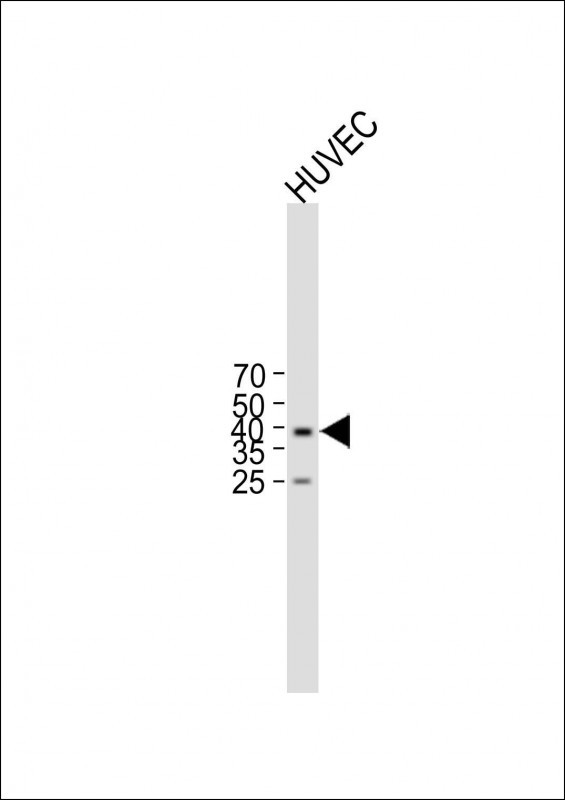
| WB | 咨询技术 | Human,Mouse,Rat |
| IF | 咨询技术 | Human,Mouse,Rat |
| IHC | 咨询技术 | Human,Mouse,Rat |
| ICC | 技术咨询 | Human,Mouse,Rat |
| FCM | 咨询技术 | Human,Mouse,Rat |
| Elisa | 咨询技术 | Human,Mouse,Rat |
| Aliases | Secreted frizzled-related protein 2, FRP-2, sFRP-2, Secreted apoptosis-related protein 1, SARP-1, SFRP2, FRP2, SARP1 |
| Entrez GeneID | 6423 |
| WB Predicted band size | 33.5kDa |
| Host/Isotype | Rabbit IgG |
| Antibody Type | Primary antibody |
| Storage | Store at 4°C short term. Aliquot and store at -20°C long term. Avoid freeze/thaw cycles. |
| Species Reactivity | Human, Mouse, Rat |
| Immunogen | This SFRP2 antibody is generated from rabbits immunized with a KLH conjugated synthetic peptide between 263-292 amino acids from the C-terminal region of human SFRP2. |
| Formulation | Purified antibody in PBS with 0.05% sodium azide. |
+ +
以下是关于SFRP2抗体的3篇参考文献示例(注:文献为示例性概括,实际引用时请核实原文信息):
---
1. **文献名称**: *SFRP2 Antibody Attenuates Wnt Signaling and Enhances Chemosensitivity in Osteosarcoma*
**作者**: Li Y, et al.
**摘要**: 该研究利用SFRP2抗体阻断Wnt信号通路,发现其可抑制骨肉瘤细胞的增殖并增强化疗药物敏感性。实验表明,SFRP2抗体通过下调β-catenin活性发挥作用,提示其作为辅助治疗的潜力。
---
2. **文献名称**: *Targeting SFRP2 in Cardiac Fibrosis: Antibody-Based Inhibition Reduces Myocardial Remodeling*
**作者**: Smith RJ, et al.
**摘要**: 研究开发了一种特异性SFRP2单克隆抗体,并在小鼠心肌纤维化模型中验证其效果。结果显示,抗体治疗显著减少胶原沉积和心脏功能恶化,表明SFRP2可能成为抗纤维化治疗的新靶点。
---
3. **文献名称**: *SFRP2 as a Diagnostic Biomarker in Colorectal Cancer: Validation via Immunohistochemical Staining*
**作者**: Tanaka K, et al.
**摘要**: 通过SFRP2抗体进行免疫组化分析,发现其在结直肠癌组织中的高表达与患者预后不良相关。研究提出SFRP2可作为潜在的诊断标志物,并提示其参与肿瘤微环境调控。
---
如需具体文献,建议通过PubMed或Web of Science检索关键词“SFRP2 antibody”或“SFRP2 therapeutic application”,结合研究领域(如癌症、心血管疾病等)筛选最新文章。
Secreted frizzled-related protein 2 (SFRP2) is a member of the SFRP family, which modulates Wnt signaling by binding to Wnt ligands or frizzled receptors, acting as a soluble antagonist. SFRP2 contains a cysteine-rich domain (CRD) homologous to the extracellular Wnt-binding region of frizzled receptors, enabling competitive inhibition of Wnt-receptor interactions. This regulation influences critical processes like embryonic development, tissue homeostasis, and cell differentiation. Dysregulation of SFRP2 is linked to diseases, particularly cancer. In tumors such as colorectal, breast, and osteosarcoma, SFRP2 often exhibits altered expression due to promoter hypermethylation, contributing to aberrant Wnt/β-catenin pathway activation and cancer progression. Paradoxically, SFRP2 may also promote angiogenesis in certain contexts, highlighting its context-dependent roles.
SFRP2 antibodies are essential tools for studying these mechanisms. They enable detection of SFRP2 expression in tissues or cell lines via techniques like immunohistochemistry (IHC) and Western blot, aiding in biomarker research. Some studies explore SFRP2's potential as a therapeutic target, with antibodies investigated for blocking oncogenic signaling or enhancing drug delivery in cancers. However, challenges remain in understanding its dual roles in tumor suppression versus pro-tumorigenic activities. Recent work also implicates SFRP2 in fibrosis and tissue repair, expanding its relevance beyond oncology. These antibodies thus support both basic research and translational applications, though functional studies require careful contextual interpretation.
×